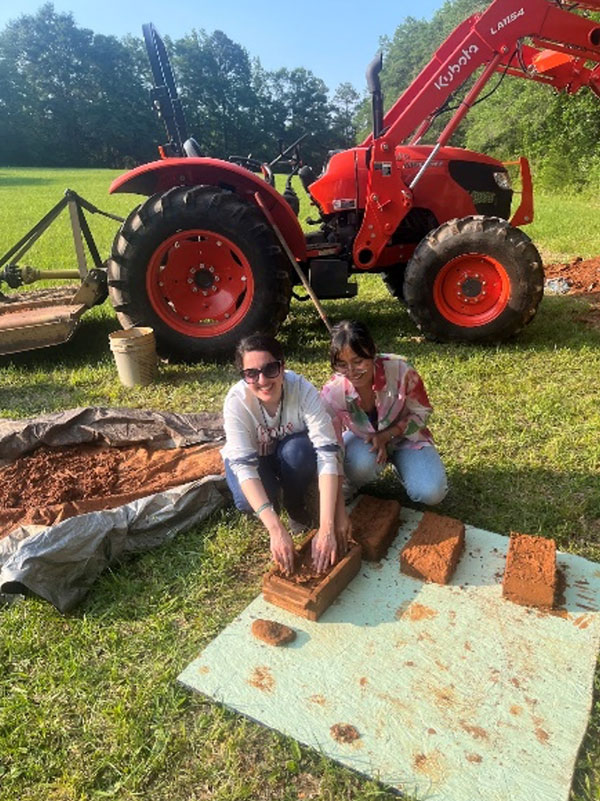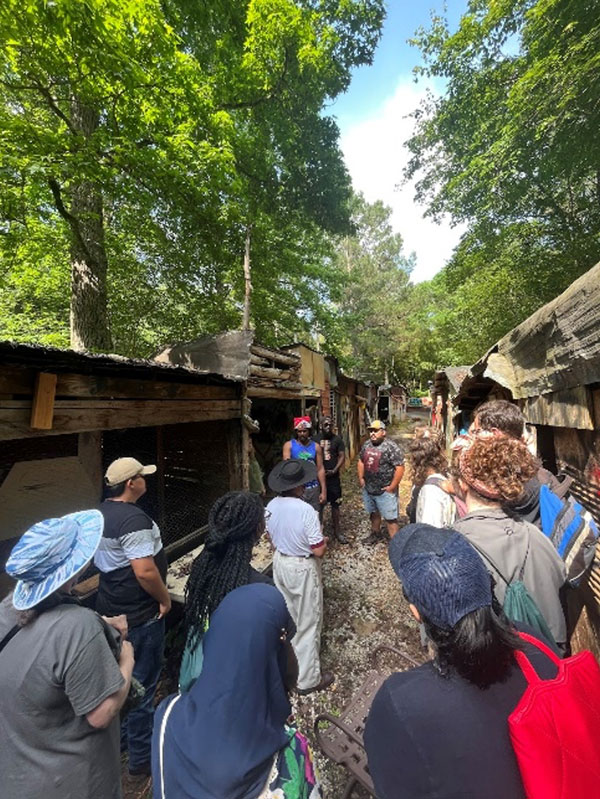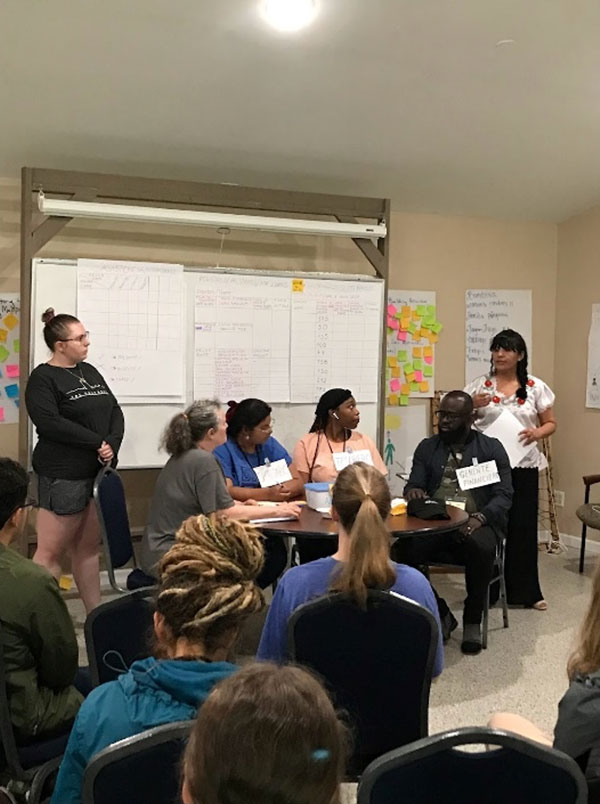 Students construct bricks to be used to build fuel-efficient cookstoves to limit indoor air pollution.The UAB Sparkman Center for Global Health offered a two-week, six-credit hour field training course designed to expose students to the major causes of world hunger and malnutrition, and to demonstrate specific appropriate technologies that can be used to combat these challenges. The course took place at the Southern Institute for Appropriate Technology (SIFAT)’s 176-acre international training campus in Lineville, Alabama, and was the first field training course offered by the Sparkman Center since the COVID-19 pandemic. The training is intended to teach students about community development and to increase sensitivity to cross-cultural issues by providing a learning atmosphere of adult participatory education, including engaged dialogue, critical thinking, simulations, and hands-on learning.
Students construct bricks to be used to build fuel-efficient cookstoves to limit indoor air pollution.The UAB Sparkman Center for Global Health offered a two-week, six-credit hour field training course designed to expose students to the major causes of world hunger and malnutrition, and to demonstrate specific appropriate technologies that can be used to combat these challenges. The course took place at the Southern Institute for Appropriate Technology (SIFAT)’s 176-acre international training campus in Lineville, Alabama, and was the first field training course offered by the Sparkman Center since the COVID-19 pandemic. The training is intended to teach students about community development and to increase sensitivity to cross-cultural issues by providing a learning atmosphere of adult participatory education, including engaged dialogue, critical thinking, simulations, and hands-on learning.
“One of the highlights of every SIFAT training is the global health experience in which students are immersed without leaving the state of Alabama,” said Emma Kate Sellers, MPH, Teaching Assistant for the course.  An experiential presentation about life in slums at SIFAT’s global village. “During the course, our students had the opportunity to learn alongside classmates from the Universidad Nacional de Agricultura in Olancho, Honduras, and to hear from guest instructors from India, Nigeria, Haiti, Colombia, Honduras, Guatemala, Bolivia, and the U.S. Along with our class of 20 diverse UAB undergraduate and graduate students, there were 17 countries represented in total, which created an atmosphere of true cross-cultural learning.”
An experiential presentation about life in slums at SIFAT’s global village. “During the course, our students had the opportunity to learn alongside classmates from the Universidad Nacional de Agricultura in Olancho, Honduras, and to hear from guest instructors from India, Nigeria, Haiti, Colombia, Honduras, Guatemala, Bolivia, and the U.S. Along with our class of 20 diverse UAB undergraduate and graduate students, there were 17 countries represented in total, which created an atmosphere of true cross-cultural learning.”
Facilitated by professionals with extensive field practice experience, this practical training at SIFAT emphasizes global issues and opportunities that address basic human needs essential to health, including water and sanitation, food and nutrition, alternative energy, microenterprise development, and participatory community development. During the course, students learned how to build vertical gardens, how to make leaf concentrate powder that prevents malnourishment, and learned simple technologies that support clean water and sanitation. SIFAT even features a global village, which gave students the opportunity to see typical houses and living situations from around the world.
 Students participate in an interactive micro-savings group activity to better understand the impact of microfinance on communities. “If I had simply read about all of these technologies to improve the quality of life for distant populations, I would not have appreciated them to extent that building them or observing them in action did,” said Sally Engler, Global Health Studies and SIFAT 2023 Student.
Students participate in an interactive micro-savings group activity to better understand the impact of microfinance on communities. “If I had simply read about all of these technologies to improve the quality of life for distant populations, I would not have appreciated them to extent that building them or observing them in action did,” said Sally Engler, Global Health Studies and SIFAT 2023 Student.
“Attending the SIFAT 2023 summer course has been a highlight of my teaching career,” said Amy Chatham, Ph.D., Assistant Dean for Undergraduate Education in the UAB School of Public Health and SIFAT course instructor. “Being in community with and learning alongside students and instructors from around the globe provided each of us with a unique experience. The opportunity to spend so much time together and to reflect on the similarities and differences between cultures provided us all with the time to consider our responsibilities as global citizens.”
At the end of the course, all students received a field training certificate in World Hunger and Malnutrition: Practical Skills to Make a Difference from the Southern Institute for Appropriate Technology. To learn more, visit the Sparkman Center’s Field Courses site.